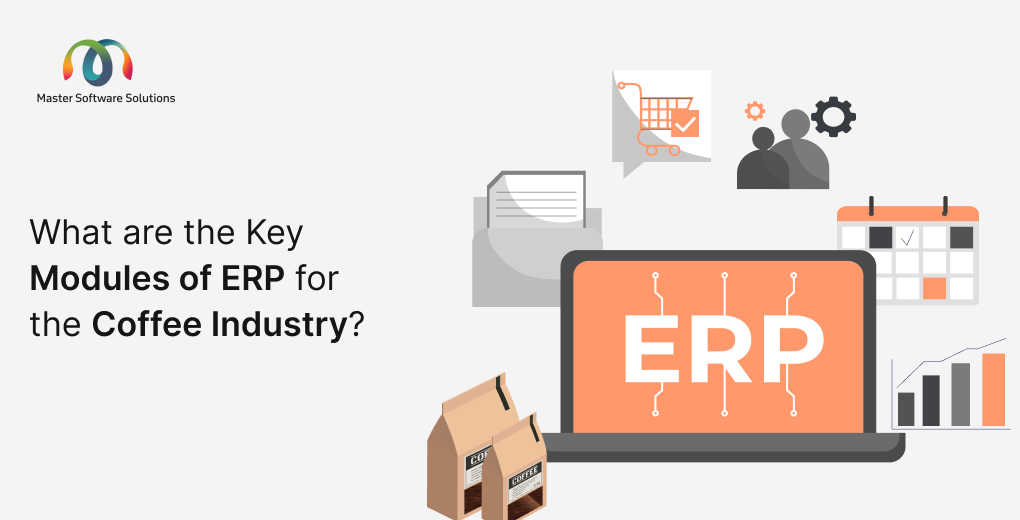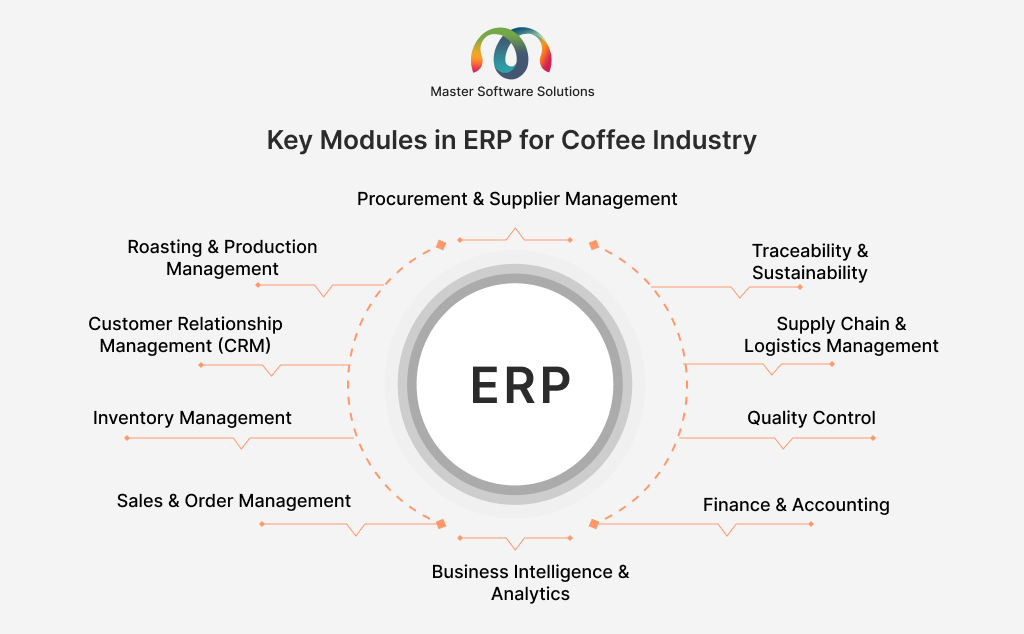The coffee industry requires precise management, from sourcing premium beans to maintaining consistent roasting profiles and ensuring timely deliveries. However, managing these interconnected operations manually often leads to inefficiencies, data silos, and quality inconsistencies. This is where an ERP (Enterprise Resource Planning) system becomes essential.
What is ERP for the coffee industry? – A custom ERP for the coffee industry centralises procurement, production, inventory, sales, and quality control into a unified platform, helping businesses maintain consistency, traceability, and efficiency across the entire supply chain.
This blog discusses the key ERP modules designed for coffee producers, roasters, distributors, and retailers. It also discovers how they contribute to more efficient operations, lower costs, and higher product quality.
What are the essential ERP modules needed to manage a coffee business?
The ERP system offers a comprehensive, interconnected platform for an end-to-end solution to manage coffee business operations. The coffee business encompasses a complex set of processes, from sourcing beans to delivering the perfect roast. Manually managing these operations can lead to errors, delays, and quality issues. An ERP system connects all the coffee business operations, including production, inventory, sales, quality control, and distribution, into a single platform. Here are the key modules in ERP for coffee industry:
Procurement and supplier management
The procurement and supplier management module in the ERP system enables coffee businesses to streamline sourcing operations, from acquiring raw coffee beans to managing supplier contracts and purchase orders. It centralizes supplier data, monitors performance, automates approvals, and ensures timely procurement to maintain smooth production operations. With real-time visibility into stock levels and purchase costs, businesses can support supply without overstocking or delays.
Key benefits of procurement and supplier management
- Efficient supplier and contract management.
- Improved cost control through price comparison and analytics.
- Real-time tracking of purchase orders and deliveries.
- Automated approval workflows to reduce manual effort.
- Consistent supply of quality raw materials for production.
Roasting and production management
The roasting and production management module in an ERP system helps coffee businesses maintain consistency, efficiency, and quality across every batch. It enables roasters to define and automate roasting profiles, track production schedules, monitor equipment performance, and record real-time data, such as temperature, time, and bean quality. You can integrate this module with the inventory and quality control modules to ensure that the right beans are used in the right quantities, reducing waste and maintaining flavor consistency.
Key benefits of roasting and production management
- Standardized roasting profiles for consistent quality.
- Real-time monitoring of roasting parameters and equipment performance.
- Reduces production errors and material wastage.
- Seamless coordination between roasting, inventory, and packaging.
- Improved traceability across each production batch.
Traceability and sustainability
Traceability and sustainability module in an ERP system enables coffee businesses to track every stage of the supply chain, from bean origin to the final packaged product. It records detailed data on sourcing, processing, transportation, and quality inspections, ensuring full transparency and compliance with sustainability standards. Integrating the module with the supplier and production modules can help verify ethical sourcing, monitor carbon footprint, and maintain certifications, such as Fair Trade or Organic.
Key benefits of traceability and sustainability
- End-to-end visibility of coffee bean origin and production.
- Compliance with sustainability and quality standards.
- Enhanced brand credibility through transparent sourcing practices.
- Easier management of certifications and audits.
- Data-driven insights to promote ethical and eco-friendly operations.
Customer relationship management (CRM)
The customer relationship management (CRM) module in an ERP system enables coffee businesses to build and maintain strong relationships with customers, whether they are wholesalers, cafes, or end consumers. It centralizes customer data, tracks communication history, manages leads and orders, and supports personalized marketing campaigns. For subscription-based or B2B coffee suppliers, it automates renewals, order reminders, and payment follow-ups, ensuring a seamless customer experience.
Key benefits of customer relationship management (CRM)
- Centralized view of the customer interactions and purchase history.
- Improved customer retention through personalized engagement.
- Streamlined order and subscription management.
- Automated sales tracking and follow-ups.
- Enhanced customer satisfaction and loyalty through timely support.
Supply chain and logistics management
The supply chain and logistics management module in an ERP system helps coffee businesses coordinate the movement of beans and finished products from farms to roasteries, warehouses, and retail outlets. It offers real-time visibility into inventory, shipments, and delivery routes, ensuring that each order reaches its destination on time and in optimal condition. Automating transportation planning, warehouse management, and demand forecasting minimizes delays, reduces operational costs, and improves fulfillment accuracy.
Benefits of supply chain and logistics management
- End-to-end visibility of inventory and shipment status.
- Optimized route and delivery planning for faster distribution.
- Reduced logistics costs through better resource utilization.
- Improved demand forecasting to prevent overstocking or shortages.
- Enhanced customer satisfaction with timely and accurate deliveries.
Inventory management
The inventory management module in an ERP system enables coffee businesses to maintain optimal stock levels of raw beans, roasted coffee, packaging materials, and finished products. It provides real-time tracking of inventory across warehouses, roasteries, and retail points, ensuring smooth coordination between procurement and production. Features, such as batch and lot tracking, barcode integration, and automated stock replenishment, help prevent stockouts, overstocking, and wastage, especially important for perishable coffee products.
Key benefits of inventory management
- Real-time visibility of inventory across multiple locations.
- Automated stock updates and reorder notifications.
- Accurate batch and lot tracking for quality and traceability.
- Reduced waste and spoilage through optimized stock control.
- Seamless coordination between procurement, production, and sales.
Quality control
The quality control module in an ERP system ensures that each batch of coffee meets the preferred flavor, aroma, and freshness before it reaches customers. It allows businesses to define quality parameters at each stage, including bean sourcing, roasting, packaging, and distribution. Automating inspection checklists, sampling tests, and real-time reporting, helping you identify early deviations and maintain product consistency. Integrated analytics also enable continuous improvement by tracking performance trends and defect patterns.
Key benefits of quality control
- Standardized quality checks at every production stage.
- Early detection of defects or inconsistencies.
- Automated testing, inspection, and approval workflows.
- Enhanced product consistency and brand reputation.
- Data-driven insights for continuous quality improvement.
Sales and order management
The sales and order management module in an ERP system helps coffee businesses efficiently handle orders from multiple channels, including cafes, distributors, and online customers. It automates the entire sales cycle, from order confirmation to invoicing and delivery tracking. Real-time integration across inventory and logistics ensures product availability, accurate pricing, and timely fulfilment. The module also supports recurring or subscription-based coffee sales, helping businesses manage repeat orders effortlessly.
Benefits of sales and order management
- Centralized management of multi-channel sales orders.
- Automated order processing and invoicing.
- Real-time stock and delivery updates for accurate fulfillment.
- Streamlined handling of recurring or subscription-based orders.
- Improved customer satisfaction through faster, error-free service.
Finance and accounting
The finance and accounting module in an ERP system provides coffee businesses with complete financial visibility and control over their operations. It automates key processes, such as billing, expense tracking, payroll, tax management, and financial reporting. You can integrate this module directly with the sales, procurement, and inventory modules to ensure that every transaction is accurately recorded and reflected in real-time. This helps coffee producers, roasters, and distributors make informed final decisions, maintain compliance, and improve profitability.
Benefits of the finance and accounting module
- Automated billing, invoicing, and payment processing.
- Real-time tracking of expenses, revenue, and cash flow.
- Accurate financial statements and tax compliance.
- Seamless integration with sales, procurement, and inventory data.
- Improved budgeting, forecasting, and profitability analysis.
Business intelligence and analytics
The business intelligence and analytics module empowers coffee businesses to turn operational data into actionable insights. It consolidates information from procurement, production, sales, finance, and inventory into interactive dashboards and reports. Real-time analytics enable managers to track performance metrics, including roasting efficiency, sales trends, supplier reliability, and profit margins. This data-driven visibility enables smarter decision-making, helping coffee businesses improve productivity, reduce waste, and forecast more accurately.
Benefits of business intelligence and analytics
- Centralized dashboards for real-time performance monitoring.
- Data-driven insights for faster and smarter decisions.
- Improved forecasting of demand, sales, and production needs.
- Identification of inefficiencies and cost-saving opportunities.
- Enhanced strategic planning with accurate, visualized reports.
How is Master Software Solutions helping the coffee industry?
Master Software Solutions is an IT-based service company that offers ERP consulting services. We provide a comprehensive solution for all of your coffee business needs, including consulting, implementation, integration, development, and migration services. We work with Odoo and Microsoft Dynamics Business Central to cater to the unique business needs of the coffee industry, offering Odoo consulting services and Microsoft Dynamics 365 consulting services, respectively. Contact us to discuss your business for ERP implementation.

